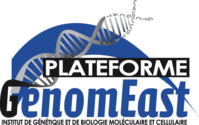MBD4 loss results in global reactivation of promoters and retroelements with low methylated CpG density
Résumé
Background: Inherited defects in the base-excision repair gene MBD4 predispose individuals to adenomatous polyposis and colorectal cancer, which is characterized by an accumulation of C > T transitions resulting from spontaneous deamination of 5’-methylcytosine. Methods Here, we have investigated the potential role of MBD4 in regulating DNA methylation levels using genome-wide transcriptome and methylome analyses. Additionally, we have elucidated its function through a series of in vitro experiments.
Results: Here we show that the protein MBD4 is required for DNA methylation maintenance and G/T mismatch repair. Transcriptome and methylome analyses reveal a genome-wide hypomethylation of promoters, gene bodies and repetitive elements in the absence of MBD4 in vivo. Methylation mark loss is accompanied by a broad transcriptional derepression phenotype affecting promoters and retroelements with low methylated CpG density. MBD4 in vivo forms a complex with the mismatch repair proteins (MMR), which exhibits high bi-functional glycosylase/AP-lyase endonuclease specific activity towards methylated DNA substrates containing a G/T mismatch. Experiments using recombinant proteins reveal that the association of MBD4 with the MMR protein MLH1 is required for this activity.
Conclusions Our data identify MBD4 as an enzyme specifically designed to repair deaminated 5-methylcytosines and underscores its critical role in safeguarding against methylation damage. Furthermore, it illustrates how MBD4 functions in normal and pathological conditions.
| Origine | Fichiers éditeurs autorisés sur une archive ouverte |
|---|
